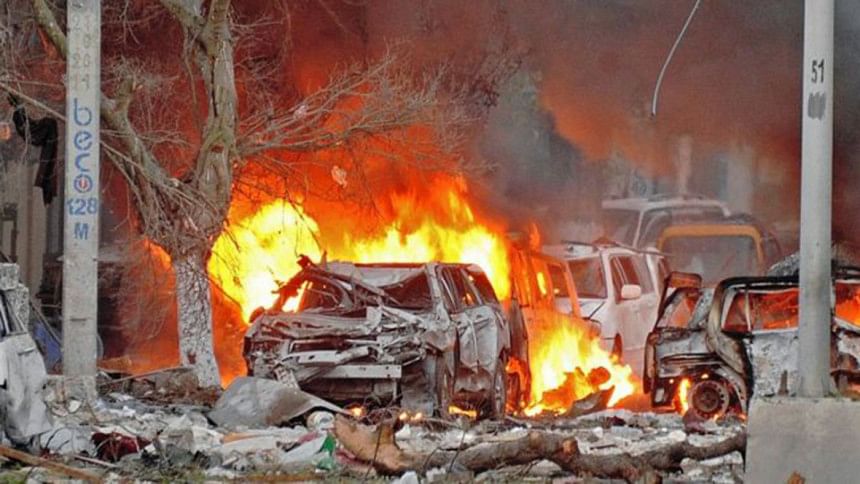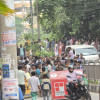Bangladesh saw rise in attacks

The US state department has said although the number of terrorist attacks around the world declined last year, terror incidents went up significantly in Bangladesh.
“In 2015, Bangladesh experienced an increase in terrorist attacks against religious minorities and government installations and for the first time, transnational groups have claimed responsibility for these attacks,” according to US Country Report on Terrorism 2015.
Justin Siberell, acting coordinator for counterterrorism at the department, on Thursday presented the annual report. It said attacks dropped by 13 percent compared with 2014 across the world, while fatalities caused by terrorist activity declined by 14 percent.
Transnational groups such as ISIL and al-Qaeda in the Indian Subcontinent (AQIS) claimed several attacks in Bangladesh, targeting foreigners, religious minorities, police, secular bloggers and publishers, stated the report.
Despite these claims, the Bangladesh government attributed recent extremist violence to the political opposition and local terrorists.
The government articulated a “zero-tolerance” policy towards terrorism and remained committed to counterterrorism cooperation, but the country experienced a significant increase in violent extremist activity in 2015 compared to 2014, the report pointed out.
Bangladesh's criminal justice system continued to make progress in fully implementing the Anti-Terrorism Act. The government forces reportedly arrested numerous “members of ISIL” and of domestic terrorist groups, including suspected supporters of Jama'atul Mujahideen Bangladesh (JMB) and Ansarullah Bangla Team, said the state department.
The country cooperated with the US to further strengthen control of its borders and land, sea, and air ports of entry. It continued to participate in the Department's anti-terrorism assistance program and received counterterrorism training for law enforcement officers in areas such as crisis response, explosive ordnance disposal and aviation security, it added.
28,300 DIED LAST YEAR
Data compiled by the University of Maryland for the state department showed there were 11,774 terrorist attacks worldwide during the year, in which more than 28,300 people died and roughly 35,300 others were wounded.
The drop was due to fewer attacks in Iraq, Pakistan and Nigeria, Siberell told a special briefing in Washington DC.
“Terrorist attacks and deaths increased in Afghanistan, Bangladesh, Egypt, the Philippines, Syria and Turkey,” he added.
Terrorist outfits used social media to spread their radical ideologies and solicit followers from Bangladesh.
An article titled “The Revival of Jihad in Bengal” appeared in the November 2015 edition of the ISIL online magazine Dabiq, outlining the outfit's activities in Bangladesh and plans for future attacks.
The ISIL claimed nine attacks, including the murder of an Italian NGO worker (September 28), a Japanese aid worker (October 3), and an attack on an Italian priest (November 18), read the report.
The outfit reportedly was behind an attack on a Shia Ashura procession (October 24) that killed one person and injured nearly 100; an attack on a police checkpoint (November 4) killing a police officer; and a December 25 suicide attack on an Ahmadiyya Muslim Community mosque.
The AQIS claimed attacks on February 26, March 30, May 12, August 7, and October 31 that resulted in the murders of four bloggers and a publisher, including an American citizen, stated the report.
The Bangladesh government insisted that ISIL didn't have an operational presence in the country and attributed the ISIL-claimed attacks to domestic elements.
Additionally, there was an unclaimed December 18 attack using crude explosives at two mosques on a naval base in Chittagong, as well as threats and small scale attacks against Christians, Hindus, and minority Muslim groups.
In each of the terrorist incidents claimed by the AQIS, attackers used machetes. The attacks claimed in the name of ISIL involved a variety of weapons: machetes, pistols and crude explosives. In the case of the attack on the Ahmadiyya mosque, a suicide vest was used, said the state department.
In February, Bangladesh participated in the White House Summit to Counter Violent Extremism and follow-on summits. It also joined the Saudi-led Islamic counterterrorism alliance announced in December last year.
The country formed the Community Support Mechanism (CSM) last year under the Global Fund for Community Engagement and Resilience (GCERF), a public-private global fund to support local, grassroots efforts to counter violent extremism.
The report said the terrorism finance provisions of Bangladesh's anti-terrorism act prohibit the provision, receipt and collection of money, services and material support where “there are reasonable grounds to believe that the same has been used or may be used for any purpose by a terrorist entity.”
The religious affairs ministry and the National Committee on Militancy Resistance and Prevention worked with imams and religious scholars to build public awareness against terrorism.
According to the report, the police last year began developing a plan to engage religious leaders in the fight against violent extremism by helping to counter terrorist propaganda with appropriate scripture-based messages.

 For all latest news, follow The Daily Star's Google News channel.
For all latest news, follow The Daily Star's Google News channel. 








Comments